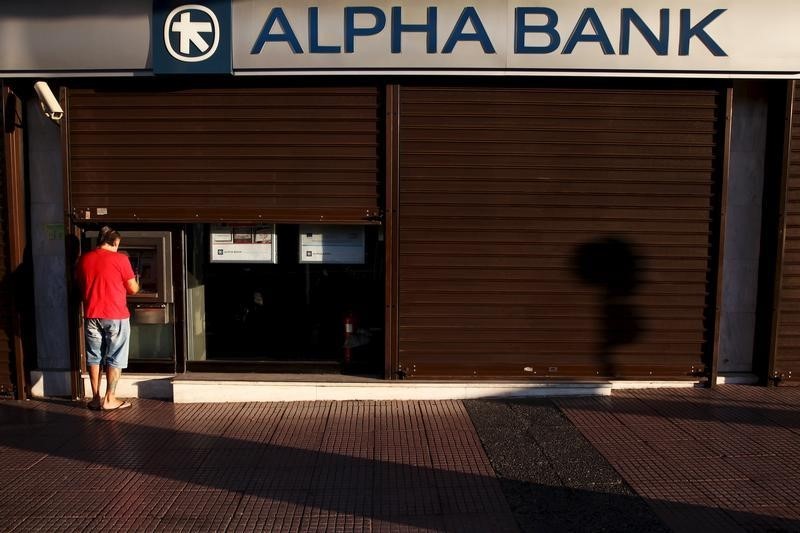By Steve Slater
LONDON (Reuters) - Greece is under growing pressure to take care of banks' problem loans so they are free to lend again, but the depth and complexity of its crisis will make it tough to replicate the comprehensive "bad bank" models set up in Ireland and Spain.
Deciding how to deal with more than 100 billion euros ($115 billion) of non-performing loans held by banks is a central part of Greece's recovery plan - and one of the biggest headaches for policymakers.
Ireland and Spain's big, state-backed 'bad banks', or asset management companies, bought bad loans from banks at knock-down prices and are managing and selling them on to investors, who can renegotiate terms to claw back as much as possible.
Setting up such a structure can be risky, and the Irish and Spanish models have not been trouble-free, but politicians and analysts say they have helped put both eurozone countries on the recovery path.
"It is needed (in Greece), but it is not the easiest place to have a bad bank," said Oliver Ellingham, a board member at NAMA, Ireland's bad bank, and a former executive at BNP Paribas (PARIS:BNPP).
A senior Greek banker said there was no appetite among the local banks to form a unified vehicle like NAMA, and reservations go wider than that.
Greece's deep economic recession, political turbulence, inadequate insolvency laws and problem loans spanning residential mortgages, small businesses and big companies all make carving out non-performing loans (NPLs) difficult and could deter investors from buying them, several restructuring advisers and investors said.
As a result, two of the advisers said although a full-scale bad bank would be Greece's best option, officials in Athens and at the European Central Bank in Frankfurt, which now supervises eurozone banks, were likely to opt for more limited plans that would be easier and quicker to implement.
They said that could mean sticking with the individual "troubled loan" units being set up within each of the four big lenders - National Bank of Greece (AT:NBGr), Piraeus (AT:BOPr), Alpha Bank (AT:ACBr) and Eurobank (AT:EURBr). Alternatively, a vehicle could be created that takes each bank's worst corporate loans, the restructuring sources said.
Economy Minister George Stathakis said on Wednesday the government had not committed to a particular option.
"A bad bank could restructure those loans using more balanced criteria that would take into account the economic and social consequences," he told a news conference.
"This was one proposal that we put on the table and it is part of the discussions. There are other solutions."
PROS AND CONS
Bad bank supporters say they speed up dealing with bad loans, which could otherwise take decades to run down and paralyze credit supply.
"It's more aggressive, but a quicker and cleaner way to solve the problem of non-performing loans (NPLs) and makes the remaining core banks more investable," said Christy Hajiloizou, credit analyst at Barclays (LONDON:BARC) in London.
A bad bank can also be more clinical with unpopular decisions, such as liquidating companies or repossessing homes, and more efficient at collecting money from borrowers. Banks can be slow to accept they made lending mistakes, especially if they still have a relationship with the borrower.
"There's a completely different mindset to resolving NPLs, which involves treating people with respect but can mean being incredibly tough on customers," Ellingham said.
Critics of bad banks say they burden taxpayers with losses as banks often take a big capital hit when the loans are transferred at knock-down prices. A state may spend billions of euros buying the assets and recapitalizing banks at the same time, hoping to recoup its outlay over many years of sales.
Bad banks can also cost millions in set-up and advisory fees, and if assets are mispriced, they can allow hedge funds to reap the rewards of a recovery.
U.S. BARGAIN HUNTERS
The influential group of eurozone finance ministers this month said Greece had to explore "the possibility of a bad bank" given the scale of its NPL problem.
The leftist Syriza party included a plan for a bad bank when it was elected in January but did not get the necessary funding when it negotiated a third bailout with creditors.
If Athens does opt for a bad bank, it will need to show it would be an independent body able to clear up the mess and be free of bureaucracy and cronyism, restructuring advisers said.
They said with elections expected on Sept. 20, a review of banks' assets due by mid-October and a recapitalization of banks targeted by the end of the year, the timeframe is tight and external advisors are being pulled in to consider options.
Greece has pledged to tackle its NPL problem with or without a bad bank, and change insolvency laws, improve judicial staff and insolvency administration and open the market for servicing and disposing loans.
The aim is to lure the U.S. private equity, hedge fund and other specialists who are the biggest buyers of distressed assets in Europe.

($1 = 0.8721 euros)